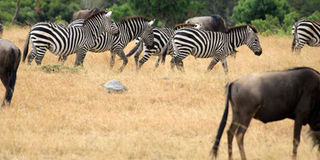Hippos die in Mara as agency assesses drought effects

Wild animals at Mara North Conservancy in Maasai Mara, Narok County, on September 16, 2016. The drought has pushed wildlife from their habitats into human settlements. PHOTO | JEFF ANGOTE | NATION MEDIA GROUP
What you need to know:
- The agency’s chief warden for Narok County, Mr Collins Omondi, said the team dispatched to assess the situation was expected to come up with solutions.
- Elephants are hardly grazing due to the diminishing pasture and are forced to walk long distances in hilly areas looking for shrubs to feed on.
Wildlife researchers have been dispatched to the Maasai Mara Game Reserve to survey the magnitude of the current drought after six hippo carcasses were discovered along the River Mara.
This comes after the Kenya Wildlife Service raised the alarm over the drought’s impact in the game reserve, with several wild animals feared dead.
The agency’s chief warden for Narok County, Mr Collins Omondi, said the team dispatched to assess the situation was expected to come up with solutions.
“We are aware of the effects of drought in the reserve. Main rivers are drying up and pasture is dwindling. We are working to see what can be done,” said Mr Omondi.
A spot check by the Nation last week revealed dozens of dying crocodiles and hippos along the drying Mara and Talek rivers which traverse the reserve.
Elephants are hardly grazing due to the diminishing pasture and are forced to walk long distances in hilly areas looking for shrubs to feed on.
Wildebeests and zebras have crossed the dry river beds, headed to Tanzania in search of greener pastures.
The drought has pushed wildlife from their habitats into human settlements, increasing the risk of conflict.
The agency is exploring alternatives, including supplying water at designated areas and blocking water pools in the River Mara for the animals to drink.
Conservationists have long argued that the Mara is living on borrowed time.
The lush pastures once bordering the reserve are now over-grazed and are today home to the growing number of resorts whose proliferation threatens the very wild animals visitors come to see.
Wildlife expert Antony ole Tira said the drying up of the rivers, whose source is in the depleted Mau Forest, is one of the many ominous signs of an ecological disaster.
Maasai herdsmen are also competing with wild animals as they explore the game reserve to graze their livestock, after their traditional grazing lands were subdivided.





